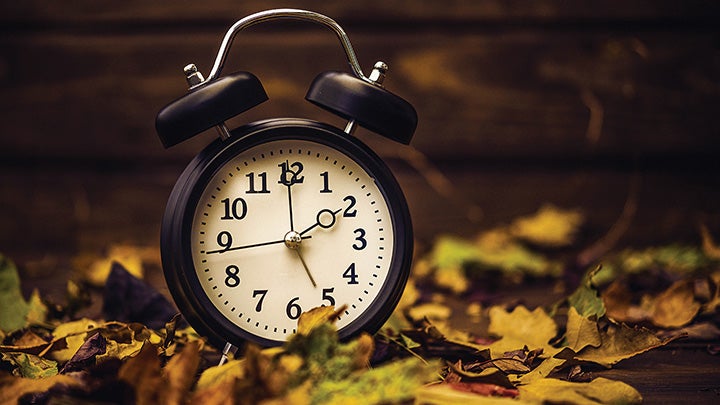Congress may be seeing the light, but is it the right one?
Published 2:00 pm Thursday, March 17, 2022

- Daylight Saving Time
Senate moves to make Daylight Saving Time permanent, some experts disagree
Lazy summer days with the sunlight painting the sky for longer periods of time makes for beautiful memories for most children experiencing Daylight Savings Time. Workers tend to enjoy the extra time they have after work “to get things done” because there’s still light outside. Families may even feel safer from criminals because the night seems shorter.
But there’s another – less idyllic – side of Daylight Saving Time: Children crowded around dark bus pickups in the mornings, air conditioners turned up to high thanks to longer times for the sun to beat down on a house. Commuters too tired to see exactly what’s in front of them – especially when they pass that crowed school bus stop.
The U.S. Senate voted unanimously this week to approve what they called the “Sunshine Protection Act.” Cosponsored by Sen. Cindy Hyde-Smith of Brookhaven, the legislation is intended to make Daylight Saving Time the new, permanent standard time.
“The process of having to reset our clocks is an irritatingly outdated practice that we should ditch,” a letter from Hyde-Smith and cosponsor Sen. Marco Rubio states. “We should instead embrace DST as a critically important way to realign daylight time to Americans’ most productive hours, while also improving public health and the American economy.”
In the United States, Daylight Saving Time lasts for 34 weeks, from March to November in states that observe the time change. Observing DST for the entire year will provide “significant health benefits” according to research, the letter says. “Studies suggest that we would see advantages to Americans’ public health, including reduced risks of seasonal depression, cardiac problems and strokes. Children exercise more during DST, and adults spend substantially more time engaged in pedestrian, cycling and other recreational activities.”
The letter said that DST is also expected to boost public safety, reducing traffic accidents as traffic patterns shift to being more in the daylight hours, and reducing crime. A Brookings study suggests it would bring a 27 percent reduction in robberies committed during the evening hour of gained sunlight, with the overall daily rate dropping by 7 percent.
“Extending DST to last the entire year would also spur the economy. A JP Morgan Chase study found that Americans experience decreased economic activity while not on DST, a drop that could be avoided by making Daylight Saving permanent. It would also benefit our nation’s agricultural sector, which ends up disproportionately affected twice a year through disruptions between farmers’ schedules and their supply chain partners. Several studies also suggest that it would lead to greater energy savings.”
The act would not alter time zones, change the total number of hours of sunlight per day or mandate states and territories that do not observe DST suddenly be forced to do so.
But there’s still a catch: While many agree that changing clocks back and forth is a self-inflicted annoyance, making “Standard Time” the time is the better way to go, experts say.
Daylight saving came about to reduce energy consumption. Setting clocks forward in the spring meant daylight extended further into the evening. More sunlight, less electricity was used, the thought went. But a 2008 study found that moving clocks forward actually increased electricity consumption as people started using more power-hungry appliances, like air-conditioning, later into the evening, Fortune Magazine reported.
And there is another downside – a sleepy one.
“Sleep scientists argue the choice of Daylight Saving Time over Standard Time-in other words, choosing the “spring forward” rather than “fall back” time—would leave Americans permanently out of sync with their natural schedule and potentially lead to a range of health issues,” Fortune Magazine reported Wednesday.
The new bill will ensure Americans live continually four hours behind Greenwich Mean Time (GMT), which spells later sunrises and sunsets. This skews things with the clocks that run our lives.
It is said there are three “clocks” in a human’s existence: the internal body clock, the social clock and the sun’s clock. Mess with one and the combination gets off kilter.
There was little discussion before the Senate passed the bill. Experts wish there had been because they had a lot to say. The American Academy of Sleep Medicine issued a statement after the Senate vote, saying setting DST as permanent leaves many health as well as personal risks for Americans.
“Standard Time, for so many scientific and circadian rationals and public health safety reasons, should really be what the permanent time is set to,” Jocelyn Cheng of the AASM told The Washington Post.
“Daylight Savings Time does not ‘save’ evening light at all – it simply steals it from the morning when it is necessary to maintain our healthy biological rhythms,” said David Neubaurer, an associate professor of psychiatry and behavioral sciences at Johns Hopkins University to the Post.
The AASM also noted that the body clock never adjusts to DST, even after several months, wreaking havoc with the natural circadian rhythm, affecting the cells of the heart and liver and confusing the body about sleep. DST disrupts the biological rhythm, causing us to be “perpetually out of synchronization with our internal clocks,” Neubaurer said. “Extra evening light suppresses the melatonin that should be preparing us for falling asleep. The later dawn … deprives our biological clocks of the critical light signal.”
One expert said of the three standards of time – standard, DST and clock switching – DST is probably “the worst.” The effect is somewhat like continuous jet lag, your body always out of sync with nature.
The bill, which requires passage by the House and then the president’s signature, would invoke the permanent time change on Nov. 20, 2023.





